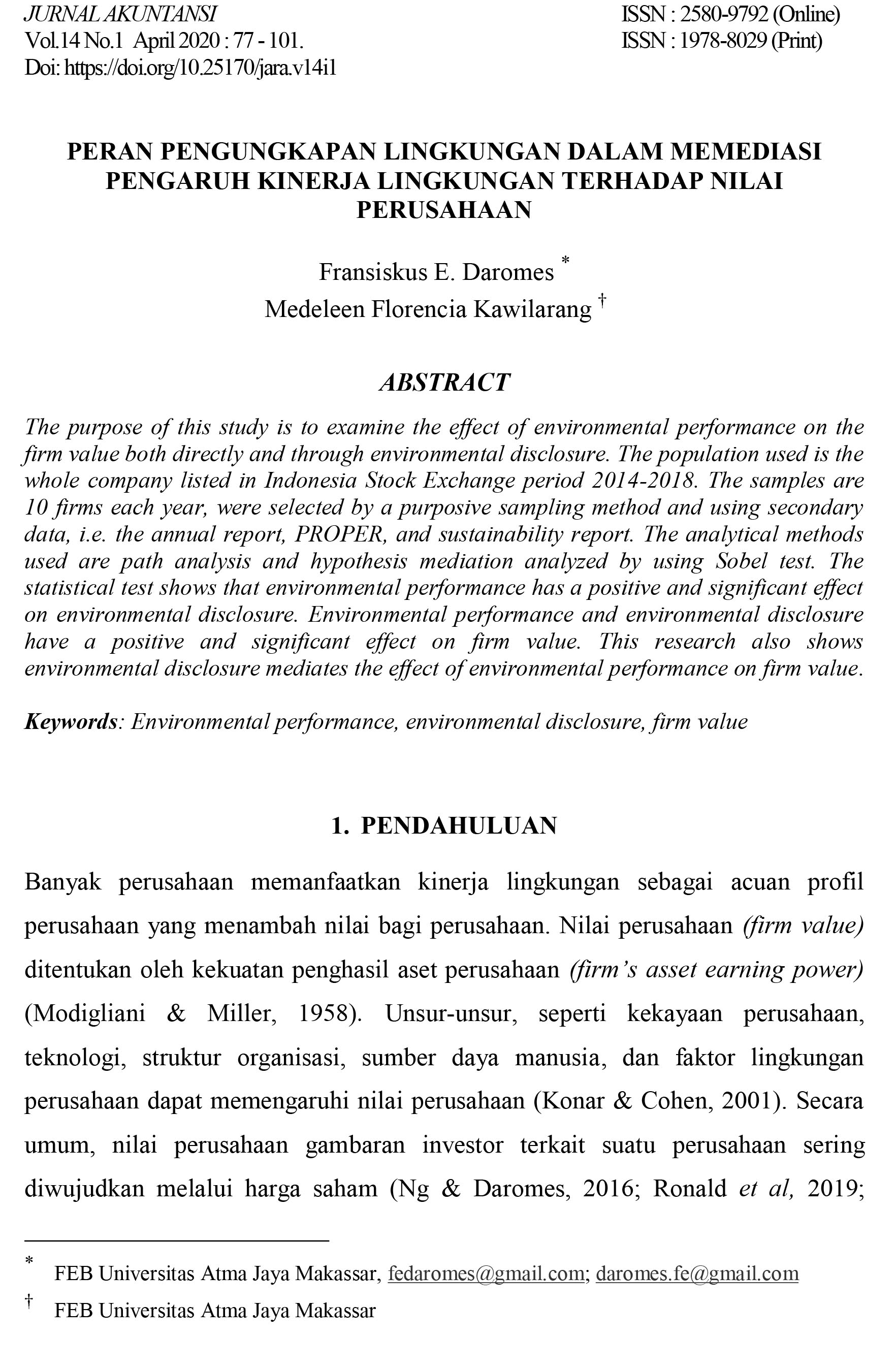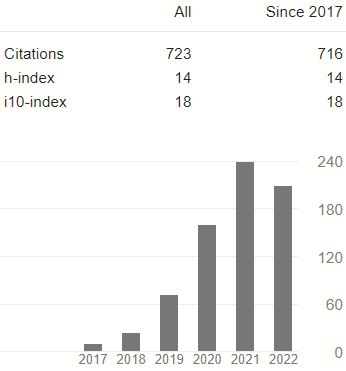PERAN MEDIASI PENGUNGKAPAN LINGKUNGAN PADA PENGARUH KINERJA LINGKUNGAN TERHADAP NILAI PERUSAHAAN
DOI:
https://doi.org/10.25170/jak.v14i1.1263Keywords:
Environmental performance, environmental disclosure, firm valueAbstract
The purpose of this study is to examine the effect of environmental performance on firm value both directly and through environmental disclosure. Population used is the whole company listed in Indonesia Stock Exchange period 2014-2018. Number of samples are 10 firms each year, were selected by purposive sampling method and using secondary data, i.e. the annual report, PROPER and sustainability report. The analytical methods used are path analysis and hypotesis mediation analysed by using sobel test. Statistical test shows that environmental performance has positive and significant effect on environmental disclosure. Environmental performance and environmental disclosure have positive and significant effect on firm value. This research also shows environmental disclosure mediates the effect of environmental performance on firm value
References
Aerts, W., Cormier, D & Magnan, M. (2008). Corporate Environmental Disclosure, Financial Markets, and the Media: An International Perspective. Ecological Economic, 64(3), 643-659
Al‐Tuwaijri, S. A., Christensen, T. E., & Hughes, K. E. (2004). The Relations Among Environmental Disclosure, Environmental Performance and Economic Performance: A Simultaneous Equations Approach. Accounting, Organizations and Society, 29(5-6), 447-471.
Anderson, J., & Frankel, A. (1980). Voluntary Social Reporting: An Iso-beta Portfolio Analysis. The Accounting Review,15(3), 467-479.
Bai, C. & Sarkis, J. (2010). Green Supplier Development Analytical Evaluation Using Rough Set Theory. Journal of Cleaner Production, 8(12), 1200-1210.
Berthelot, S., D, Cormier & M. Magnan (2003). Environmental Disclosure Research: Review and Synthesis. Journal of Accounting Literature, 22, 1-44.
Clarkson, M. B. E. (1995). A Stakeholder Framework for Analyzing and Evaluating Corporate Social Performance. Academy of Management Review., 20(1), 92-117.
Clarkson, P. M., Fang, X., Li, Y., & Richardson, G. (2013). The Relevance of Environmental Disclosures: Are Such Disclosures Incrementally Informative? Journal of Accounting and Public Policy. 32 (5), 410-431.
Clarkson, P.M., Li, Y., Richardson, G.D & Vasvari, F.P. (2008), Revisiting the Relation between Environmental Performance and Environmental Disclosure: An Empirical Analysis. Accounting, Organizing, and Society, 33 (4-5),303-327
Clarkson, P. M., Overell, M. B., & Chapple, L. (2011). Environmental reporting and its relation to corporate environmental performance. Abacus, 47(1), 27-60.
Christiawan, Jogi Yulius & Tarigan Josua (2007). Kepemilikan Manajerial: Kebijakan Hutang, Kinerja dan Nilai Perusahaan. Jurnal Akuntansi dan Keuangan, 9(1), 1-8.
Cormier, D. & Gordon, I.M. (2001). An Examination of Social and Environmental Reporting Strategies. Accounting, Auditing & Accountability Journal, 4(5), 587-617.
Cormier, D., Aerts, W & Ledoux, M-J (2009). Attributes of Social and Human Capital Disclosure and Information Asymmetry between Managers and Investors. Health and Safety in Organizations, 26(1).
Dawkins, C. & Fraas, J. (2011). Coming Clean: The Impact of Environmental Performance and Visibility on Corporate Climate Change Disclosure. Journal of Business Ethics,100(2), 303-322.
Dowling, J. & Pfeffer, J. (1975). Organizational Legitimacy: Social Values and Organizational Behavior. Pacific Sociological Review, 18(1), 122-136.
Fama, EF & French, K (1998). Value Versus Growth: The International Evidence. Journal of Finance, 53, 1975-1999.
Frederick W., Post, J & Davis, KE. (1992). Business and Society. Corporate Strategy, Public Policy, Ethics 7th edition. McGraw-Hill: London.
Freeman, R. E., Phillips, R., & Sisodia, R. (2018). Tensions in Stakeholder Theory. Business and Society.
Freeman, R. E., & Reed, D. L. (1983). Stockholders and Stakeholders: A New Perspective on Corporate Governance. California Management Review.
Gaio, C & Raposo, C (2011). Earnings Quality and Firm Valuation: International Evidence. Accounting and Finance, 51(2), 467-499.
Gelb, David S dan Strawser, Joyce A. (2001). Corporate Social Responsibility and Financial Disclosures: An Alternative Explanation for Increased Disclosure. Journal of Business Ethics, 33(1), 1-13.
Ghozali, Imam (2013). Aplikasi Analisis Multivariate dengan Program IBM SPSS 21 Update PLS Regresi. Semarang: Badan Penerbit Universitas Diponegoro.
Gray, R.H., D.L. Owen & C, Adams. (1996). Accounting and accountability: Changes and challenges in corporate social and environmental reporting (London: Prentice Hall).
Hart, Stuart L. (1995) A Natural-Resource-Based View of the Firm. The Academy of Management Review, 20(4), 986-1014.
Haruman, Tendi. (2007). Pengaruh Keputusan Keuangan dan Kepemilikan Institusional Terhadap Nilai Perusahaan”. PPM National Conference on Management Research.
Hassan, O. A. G. (2018). The Impact of Voluntary Environmental Disclosure on Firm Value: Does Organizational Visibility Play A Mediation Role? Journal of Business Strategies Environmental, 27(8), 1569-1582.
Hassel, Lars., Nilsson, Henrik & Nyquist, Siv. (2005) The Value Relevance of Environmental Performance, European Accounting Review, 14(1), 41–61.
Henri, J.F., & Journeault, M. (2010). Eco-control: The Influence of Management Control Systems on Environmental and Economic Performance. Accounting Organization and Society, 35(1), 63-80
Hogner, R.H. (1982). Corporate Social Reporting: Eight Decades of Development at US Steel. Research in Corporate Performance and Policy, 4, 243-250.
Hughes, S.B., Anderson, A., & Golden, S. (2001). Corporate Environmental Disclosures: Are They Useful in Determining Environmental Performance? Journal of Accounting and Public Policy, 20(3), 217-240
Kamil, Ahmad & Antonius Herusetya (2012). Pengaruh Karakteristik Perusahaan Terhadap Luas Pengungkapan Kegiatan Corporate Social Responsibility. Jurnal Media Riset Akuntansi, 2(1).
Kelvin, C., Daromes, F. E., & Ng, S. (2017). Pengungkapan Emisi Karbon Sebagai Mekanisme Peningkatan Kinerja Untuk Menciptakan Nilai Perusahaan. Dinamika Akuntansi Keuangan dan Perbankan, 6(1).
Konar, Shameek & Mark Cohen (2001), “Does the Market Value Environmental Performance?” Review of Economics and Statistics, 83(2), 281-289.
Lankoski, L. (2000). Determinants of Environmental Profit: An Analysis of the Firm-level Relationship between Environmental Performance and Economic Performance. Espoo: Helsinki University of Technology, Institute of Strategy and International Business.
Li, Y., Richardson, G. D., & Thornton, D. (1997). Corporate Disclosure of Environmental Information; Theory and Evidence. Contemporary Accounting Research, 14(3), 475–480.
Lindblom, C. K. (1994). The Implications of Organizational Legitimacy for Corporate Social Performance and Disclosure. Critical Perspectives on Accounting Conference. New York, NY.
Lober, D. J. (1996). Evaluating the Environmental Performance of Corporations. Journal of Managerial Issues, 8(2), 184-205.
Luoma-aho, V & Paloviita, A. (2010). Actor-networking Stakeholder Theory for Corporate Communications. Corporate Communications: An International Journal, 15(3), 315-331.
Mahadeo, J.D., Oogarah-Hanuman, V., & Soobaroyen, T. (2011). Changes in Social and Environmental Reporting Practices in An Emerging Economy (2004–2007): Exploring the Relevance of Stakeholder and Legitimacy Theories. Accounting Forum, 35(3):158-175.
Matiin, N., Ratnawati, T., Riyadi, S. (2018). The Influence of Investment Decisions, Funding Decisions, Risk of Strategy, To Efficiency, Finance Performance, Value of Firm, Good Corporate Governance As Moderating Variable In The Mining Company Coal Sub Sector Go Public In Indonesia Stock Exchange. Archives of Business Research, 6(6).
Modigliani, F. & Miller, M.H. (1958). The Cost of Capital, Corporation Finance and the Theory of Investment. The American Economic Review, 48(3), 261-297.
Moser, Donald V & Martin, Patrick R. (2012) A Broader Perspective on Corporate Social Responsibility Research in Accounting. The Accounting Review, 87(3), 797-806.
Ng, S., & Daromes, F. E. (2016). Peran kemampuan manajerial sebagai mekanisme peningkatan kualitas laba dan nilai perusahaan. Jurnal Akuntansi dan Keuangan Indonesia, 13(2), 174-193.
Pflieger, Juli., Matthias Fischer., Thilo Kupfer., & Peter Eyerer (2005). The Contribution of Life Cycle Assessment to Global Sustainability Reporting of Organization. Management of Environmental, 16(2), 167-179.
Plumlee, M., Brown, D., Hayes, R. M., & Marshall, R. S. (2015). Voluntary Environmental Disclosure Quality and Firm Value: Further Evidence. Journal of Accounting and Public Policy, 34, 336–361.
Qiu, Y. Shaukat, & A. Tharyan, R. (2016). Environmental and Social Disclosures: Link with Corporate Financial Performance. The British Accounting Review, 48(1), 102-116.
Reverte, C. (2009). Determinants of Corporate Social Responsibility Disclosure Ratings by Spanish Listed Firms. Journal of Business Ethics. 88(2), 351-366.
Ronald, S., Ng, S., & Daromes, F. E. (2019). Corporate Social Responsibility as Economic Mechanism for Creating Firm Value. Indonesian Journal of Sustainability Accounting and Management, 3(1), 22-36.
Siegel, D.S. (2009). Green Management Matters Only if it Yields More Green: An Economic/ Strategic Perspective. Academy of Management Perspectives, 23(3), 5-16.
Simnett, R., Vanstraelen, A., & Chua, W.F. (2009). Assurance on Sustainability Reports: An International Comparison. The Accounting Review, 84(3), 937-967.
Soliha, Euis & Taswan (2002). Pengaruh Kebijakan Hutang terhadap Nilai Perusahaan serta Beberapa Faktor yang memengaruhinya. Jurnal Bisnis dan Ekonomi.
Suchman, M.C. (1995). Managing Legitimacy: Strategic and Institutional Approaches. Academy of Management Review, 20 (3), 571-610
Suratno, I. G., Darsono., & Mutmainah, S. (2006). Pengaruh Environmental Performance terhadap Environmental Disclosure dan Economic Performance. Simposium Nasional Akuntansi 9. Padang.
Tjahjono, Mazda Eko Sri. (2013). Pengaruh Kinerja Lingkungkan terhadap Nilai Perusahaan dan Kinerja Keuangan. Jurnal Ekonomi, 4(1).
Wang, M. C. (2017). The Relationship between Firm Characteristics and the Disclosure of Sustainability Reporting. Sustainability, 9(4), 624.
Wilmshurst, T.D & Frost, G.R. (2000). Corporate Environmental Reporting A Test of Legitimacy Theory. Accounting, Auditing & Accountability Journal, 13(1), 10-26.
Wood, D. J. (1991). Corporate Social Performance Revisited. Academy of Management Review, 16, 691-718.
Xie S, Hayase K. (2007). Corporate Environmental Performance Evaluation: A Measurement Model and A New Concept. Business Strategy and the Environment, 16(2), 148-168.
Zabetha, Olinsca., Tanjung, A. R. & Enni, S. (2018). Pengaruh Corporate Governance, Kinerja lingkungan dan Kinerja Keuangan terhadap Nilai Perusahaan dengan Pengungkapan Corporate Social Responsibility sebagai Variabel Moderasi. Jurnal Ekonomi, 26(2), 1299-1326.

Downloads
Published
Issue
Section
License
Authors who publish with this journal agree to the following terms:
- Authors retain copyright and grant the journal right of first publication with the work simultaneously licensed under a Creative Commons Attribution-ShareAlike 4.0 International License that allows others to share the work with an acknowledgment of the work's authorship and initial publication in this journal.
- Authors are able to enter into separate, additional contractual arrangements for the non-exclusive distribution of the journal's published version of the work (e.g., post it to an institutional repository or publish it in a book), with an acknowledgment of its initial publication in this journal.
- Authors are permitted and encouraged to post their work online (e.g., in institutional repositories or on their website) prior to and during the submission process, as it can lead to productive exchanges, as well as earlier and greater citation of published work.














